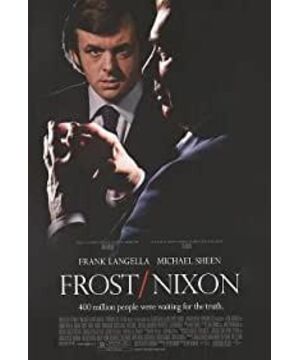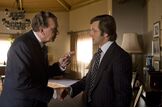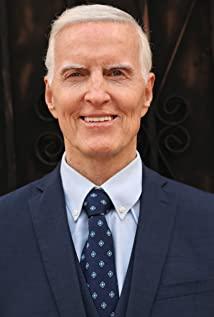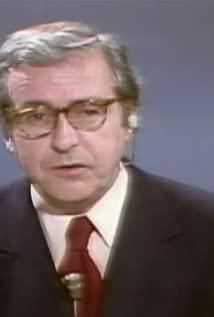The Movie commented on Ron Howard's film "Frost/Nixon", "The film is full of lines, conversations, monologues from beginning to end...but It doesn't make people feel dull or boring." It is true that the film does not have the dull and boring feeling of such films, but let most viewers spend more than two hours watching a political topic and are more inclined to The films that excavate and analyze sensitive characters’ personalities seem a bit tiring, so I considerately think that, except for those who are particularly interested in the “Watergate Incident” and Nixon himself, or those who belong to the category of idlers and movie fans, others are dedicated to a better life and better life. Chinese aspiring people who pursue work can wait for a while.
Before the film version of "Foster Talks to Nixon", the stage play of the same name premiered in London in 2006. Because it is a "solid and mature work" with "complete theatrical structure and texture", it quickly became popular. Landing on Broadway, which played Nixon, Frank Langella also won the 2007 Tony Award. Both the film version and the stage version are based on a real TV interview 30 years ago, which excited the television media and Americans at the time, and was hailed as a turning point in the history of TV interviews. After the beginning of the new model of "high-end interview" programs, and it also has a certain influence on the political history of the United States, as for the American people, it seems that the interview finally made the always confident and stubborn former President Nixon say "I let the American people Disappointed” were comforted by the apology, despite repeated disappointing decisions by the presidents after them.
Dialogue is the main support and composition, which belongs to the strength of the stage play. Different from the presentation characteristics of the stage, the film version uses the vocabulary and technology of the film, which makes it have a more free form of expression, surpassing the limitations of the stage, and the focus of the plot. From the interview itself, to the inside and outside of the interview, and focus on the preparations and mentality changes of the two sides before and after the interview, and shape the characteristics of the characters. For example, it highlights Nixon's pragmatic and shrewd side. After resigning, he clearly marked his worth, and his two hands are like money rakes. "Watergate Incident". At the same time, he was arrogant and confident, and even though he took the blame and resigned, he never publicly expressed guilt for his actions until the end of the interview that took place in 1977. For another example, the film also expresses that before this important and eye-catching political interview, David Foster's clever mouth and flowery demeanor as a famous British entertainment gossip anchor was responsible for the unsuccessful previous interviews. Buried some factors.
The screenwriter of the film is also the screenwriter of the stage version, Pete Morgan, who has created famous political images such as Queen Elizabeth II in the film "The Queen" and General Armin in "The Last Dictatorship", although the review of "Holiday Movie" believes that , "In the film, the role and skill of the screenwriter is almost invisible, because the interviews limit and provide almost all dialogues, but the traces of the director's meticulous carving are very clear." But in fact, Morgan's screenwriting effect is still To be sure, at least some of the fictional plots in order to shape characters reflect his ability to use internal and external factors to portray characters. It seems that director Ron Howard is very satisfied with the script, thinking that it is "full of conflict and reflection, unusually plump and solid", and the open attitude and position adopted by the film also give it a taste of witnessing history.
Foster's conversation with Nixon. This famous interview was recorded in four days at that time. The first three, especially the first one, completely presented a one-sided situation. "Entertainment Mouth" Foster is obviously not good at speeches and detours. Tactical Nixon's opponent, and Nixon's determination to use this interview to return to the public eye is very strong. Although the teams on both sides are well prepared, they are more entertaining than Foster, Nixon and his team. In order to be full of confidence, he seized every opportunity to speak with a sincere tone and attitude, trying to remind people of his positive contributions during his political career, arouse the sympathy and trust of the people, and rewrite his own history.
When presenting the interview scenes, the film mostly uses close-up shots to show the inner battle between the two of them. In the first three interviews, Nixon clearly occupies the dominant advantage. With a dull face, the wide-eyed baby face was full of unconfidence and uncertainty. In addition to focusing on the character traits and the presentation of interviews, Ron Howard also used the "old appearance" of the actors who participated in the characters at that time to raise points and summarize each point in the form of a documentary interview and appearance, and promote the continued development of the plot. Obviously, the effect of promoting the plot is achieved, but the application of this move is not as novel as some classmates praised it, but instead makes the supporting characters show a trend of facialization and simplification.
Foster and Nixon, who compete in the film, seem to have completely different personalities, but they have similarities in their pursuit of success. They both want to take advantage of this. Foster wants to use this interview to expand his field of work and open up himself. In the hosting market in the United States, he bet his reputation on this interview with only one winner, but he did not fully enter the state until the last moment, and the situation before the interview frequently occurred, such as sales and advertising. The important things always distracted him, and people who were too stressed couldn't find a suitable way for a while, so at first he retreated, and before the last interview, the phone call from a drunk Nixon failed. Knocked on him, although this call, in the eyes of the sober Nixon, could not have happened, but this call did give Foster the way and the confidence to fight back...
In terms of performance, acting in the stage play Nixon's Frank Langella and Michael Sheen, who played Foster, both went on to star in their respective roles (a condition for Ron Howard's film), and Frank Langella's superb performance clearly supports the film's dynamic axis Xin, he not only has extraordinary skills in his lines, but also vividly portrays Nixon's personality, which is very dramatic. Almost every facial expression has hidden inner drama, but there is no trace of performance (many fans are in the film "Departing at Night". "I had a taste of his acting skills). And Foster, played by Mike Sheen, is a bit suspected of performing too well, no matter if the anchor before the interview or the beautiful turnaround later. Rebecca Hall, who has good acting skills in "Midnight in Barcelona", appears completely unnecessary in this play. Being a vase is not a pure vase, and it seems that the effect of acting as the inspiration for Foster's low ebb is not as good as it is. A drunken phone call from Nixon.
The highlight of the film is undoubtedly the end of the famous interview, when pushed to the dead end of heart, mind and language, Nixon is like a depressed beast, all strength, stubbornness, self-confidence and arrogance have been dialed away. , he is no longer an all-powerful politician, but just a lost and depressed old man. Compared with the radiance in the previous shots, he seems to have aged a lot in an instant. At this time, people's perceptions are very subtle, not as excited as the "angry young writer" in the film, but a sense of desolation and sadness.
At the end of the film, the radical writer played by Sam Rockwell said that Nixon's only legacy is that "the suffix 'door' will be added to future political scandals." Then, the camera turns to the unemployed Nixon's lonely expression, He looked down at the Italian leather shoes that Foster had given him, and his heart seemed to be swirling. The lonely and aging back looking at the sea alone on the railing under the sunset...
( http://nicolew.blog.hexun.com/28532293_d.html )
View more about Frost/Nixon reviews











